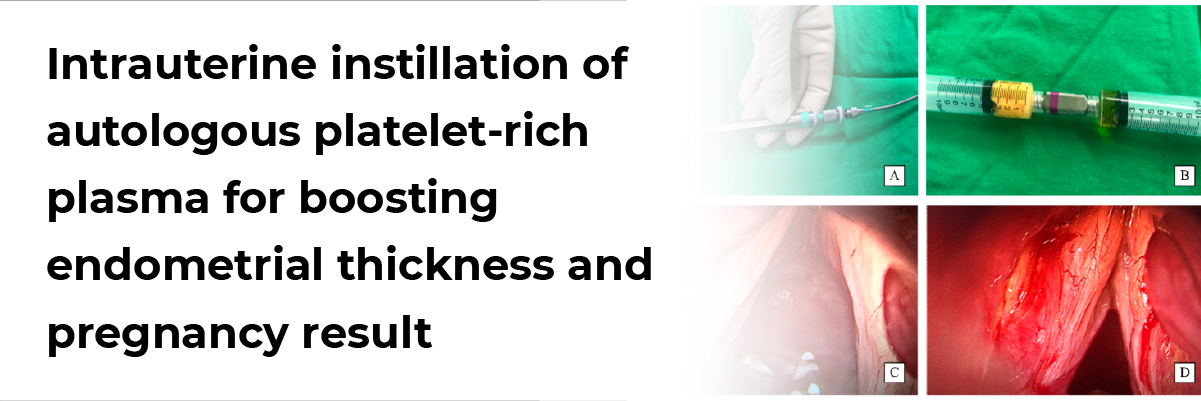
 IJCP Editorial Team
IJCP Editorial Team
Intrauterine instillation of autologous platelet-rich plasma for boosting endometrial thickness and pregnancy result
Infertility has now become a major problem in reproductive lives globally, detecting numerous females as infertile annually. The present study evaluated the efficacy of intrauterine infusion of autologous platelet-rich plasma (PRP) in infertile females seeking frozen embryo transfer cycles with suboptimal endometrium.
The study included 61 women between 22 to 40 years of age. Based on hysteroscopy findings, the study divided them into group A (Normal hysteroscopy findings) and group B (Abnormal hysteroscopy findings). It performed Intrauterine instillation of autologous PRP in women with an endometrial thickness of ≤7, even after providing Estradiol valerate therapy. The study evaluated an increase in EMT after 48 and 72 hours of PRP infusion. It conducted Embryo transfer when the endometrium reached an optimal pattern regarding thickness, appearance, and vascularity.
The study observed-
- Significant increase in EMT in Group B compared to Group A.
- no obvious changes in CPR, IR, or LBR between both groups.
- Increase in overall clinical pregnancy and LBR.
- This study shows that autologous platelet-rich plasma enhances the endometrial thickness and pregnancy success rate after PRP administration in patients with low EMT undergoing IVF treatment and with two or more prior IVF failures.
Desai K, Desai F, Sharma H, Bambhaniya H, Sharma S, Effect of intrauterine instillation of autologous platelet-rich plasma on endometrial thickness and pregnancy outcome. Indian J Obstet Gynecol Res 2023;10(1):36-41

IJCP Editorial Team
Comprising seasoned professionals and experts from the medical field, the IJCP editorial team is dedicated to delivering timely and accurate content and thriving to provide attention-grabbing information for the readers. What sets them apart are their diverse expertise, spanning academia, research, and clinical practice, and their dedication to upholding the highest standards of quality and integrity. With a wealth of experience and a commitment to excellence, the IJCP editorial team strives to provide valuable perspectives, the latest trends, and in-depth analyses across various medical domains, all in a way that keeps you interested and engaged.
More FAQs by IJCP Editorial Team
slot pulsa
slot gacor
akang69
akang69
slot pulsa
akang69
akang69
slot pulsa
slot pulsa
https://chateraise.org/menu/
slot gacor
kanjeng69
https://www.seansprimedining.com/dine
slot gacor
slot demo
akang69
slot gacor
slot pulsa
slot pulsa
akang69
https://valentinesdaycountdown.com/
slot jepang
slot gacor
slot gacor
slot88
slot gacor
slot gacor
akang69
akang69
akang69
akang69
slot gacor
slot gacor
slot gacor
https://www.alpinecafeandbakery.com/menu.html
https://applebeesmenu.us/applebees-lunch-menu/
https://bakeryandsweets-fest.com/product-highlight/
https://sevenseassushi.com/menu/
slot gacor
slot777
https://freakout.club/
slot gacor
slot gacor
https://rsgm.moestopo.ac.id/instalasi-rawat-jalan/
slot gacor
slot pulsa
slot gacor
slot gacor
http://www.motohom.co.in/
slot pulsa
https://intervencion.uahurtado.cl/
slot pulsa
slot pulsa
https://www.kp2.it.maranatha.edu/
slot gacor
slot gacor
mahjong ways
slot gacor
https://azure3.test.utah.edu/
https://iceam.unimap.edu.my/
https://sindika.co.id/contact/
slot gacor
slot gacor
slot pulsa
https://jhep.unimap.edu.my/
slot gacor
Kartu Pokémon Naik Harga!! Penghobi Naik Drastis, Bermain No Limit Dapat Cuan Berlimpah
Resep Putar Hemat WD Paus di Sugar Rush, Murah Namun Ampuh!
Seseorang Terlihat Jauh Lebih Muda dari Usianya, 7 Game Big Bass Crash yang Menguntungkan
Tukang Bubur Demi Beli Honda Megapro Terbaru, Main PGSoft di Kanjeng Jadi Jutawan!
slot gacor
slot pulsa
https://portal.kaafuni.edu.gh/
https://www.thedeenshow.com/
https://elektro.trunojoyo.ac.id/
https://pgsd.trunojoyo.ac.id/
http://www.gmci.in/
https://www.medigunakhisar.com/contact/
https://www.medigunakhisar.com/category/doktorlar/
https://www.medigunakhisar.com/about/
https://www.oscarstores.com/
https://ritalabailaora.com/
https://journal.stiepertiba.ac.id/official/
https://shopifyvps.trackship.co/
https://krandeganbayan.id/
https://www.imik.edu.in/
https://www.natasshaselvaraj.com/
http://ebphtb.banjarnegarakab.go.id/
https://bigbiteonpitt.com.au/
https://sigen.kaltimprov.go.id/
http://rju.parco.gov.ba/
https://samajpragatisahayog.org/
https://bendismea.be.gov.ng/
https://mozaiktravel.id/
https://xm42newdev.wpengine.com/
https://epr.rw/
https://tribelio.page/slotpulsa
https://mhs.akpertgkfakinah.ac.id/
http://lms6.digivarsity.com/
https://ssr.vinayakamission.com/
https://prelnor.molg.go.ug/gallery/
https://englishfocus.upstegal.ac.id/
akang69
https://virtex.canadianminingexpo.com/
slot pulsa
slot bet 200
slot online
convocation.aiou.edu.pk/
https://qna.bpsaceh.com/
https://storage.therapyrooms.com/
https://www.inaexport.id/
https://vmrfdu.edu.in/
https://www.jniemann.it/
https://katalog.intanonline.com/view/
akang69
akang69
akang69
https://affordableadsgroup.com/
https://doktor.fisip.hangtuah.ac.id/
https://um.originmena.com/
https://primemarkets.com.sa/branches
https://primemarkets.com.sa/
https://www.aqtiverse.in/images/
slot gacor
https://rokomarifood.com/
https://beritrust.com/
https://dispora.sumbarprov.go.id/imgs/
slot pulsa
http://pubma.edostate.gov.ng/
https://palermo.if.ua/
akang69
slot qris
http://husc.hueuni.edu.vn/
https://www.grupogasca.com/
slot pulsa
https://ukm.stiedharmaputra-smg.ac.id/
https://ppid.mukomukokab.go.id/
slot gacor
https://s1cs.stmikroyal.ac.id/
https://terlaksana.co.id/img/
slot pulsa
https://graduation.sjctni.edu/SJCGRAD24/abc_id.php
https://admission.sjctni.edu/
https://camarabonitodeminas.mg.gov.br/oficios/
https://kmob.jabarprov.go.id/
https://ssm.school.ssmetrust.in/
https://cjnc.ppnijateng.org/
https://paisaje.age-geografia.es/
slot pulsa
hasilwin
demototo
http://majaslapa.lv/media/
slot gacor
https://sumpah.ppnijateng.org/
https://www.uniabuja.edu.ng/
https://training.super5.org/
slot pulsa
slot gacor
https://mmi.edu.pk/find-a-doctor/
https://lonsuit.unismuhluwuk.ac.id/
slot pulsa
slot gacor
https://taxicarudaipur.com/
slot pulsa
slot gacor
slot gacor
slot gacor
slot pulsa
https://siraberu.mixh.jp/
slot gacor
slot pulsa
slot gacor
https://hkg.methodist.org.hk/
slot gacor
https://www.asopa.org/
https://fisip.unismuhluwuk.ac.id/
slot gacor
https://www.panganku.org/id-ID/semua_nutrisi
https://ejurnal.ikippgribojonegoro.ac.id/
slot gacor
https://katalog.intanonline.com/view/
https://stikesgrahaedukasi.ac.id/
https://kec.slogohimo.wonogirikab.go.id/
https://www.facesulavirtual.net/efaces/
https://www.gratisongkir.id/
https://bukupdpi.klikpdpi.com/
https://ilp.mizoram.gov.in/
https://www.campdoha.org/
slot gacor
slot gacor
https://katalog.intanonline.com/
slot gacor
https://munabarat.go.id/index.php
https://youtube.klikpdpi.com/
https://katalog.intanonline.com/lazada.IM.im-msgbox
https://understandquran.com/
https://youtube.klikpdpi.com/
https://gratisongkir.id/console/
https://gratisongkir.id/vagrant/
https://www.gratisongkir.id/uploads/
https://www.gratisongkir.id/assets/
https://snyderfamilyband.com/
https://handholding.mizoram.gov.in/
https://dconline.mizoram.gov.in/
https://siva.umkendari.ac.id/
https://www.gthlcanada.com/
https://www.gratisongkir.id/assets/
https://www.vidyasthalilawcollege.com/
togel toto
slot gacor
https://www.facesulavirtual.net/
hasilwin
https://amertamedia.co.id/
https://www.gulfstarsauto.com/
https://aptika.id/
https://www.bytestechnolab.com/
slot gacor
slot deposit 10k
slot singapore
slot thailand
AKANG69
AKANG69
https://snyderfamilyband.com/
slot gacor
https://epaper.notunshomoy.com/
https://development.upr.ac.id/
https://fornas.kebijakankesehatanindonesia.net/
slot gacor
slot pulsa
https://e-anatolh.com/
slot gacor
slot thailand
slot pulsa
kanjeng69
https://loudhelp.com/
slot thailand
https://ipss-addis.org/
slot gacor
https://engineering.upstegal.ac.id/
slot gacor
https://sipaksi.unpak.ac.id/
https://pbi.teknik.unmuha.ac.id/
https://bkd.inkhas.ac.id/files/
https://barcode.akbidyahmi.ac.id/
https://sdcirebonislamic.cerdig.com/
https://tilganga.org/
https://siperjaka.ms-langsa.go.id/
slot pulsa
https://dinsos.bekasikab.go.id/
https://stkq.alhikamdepok.ac.id/
http://fmipa.upr.ac.id/
https://beasiswaperintis.id/
slot pulsa
slot pulsa
https://www.thebestflushingtoilet.com/
https://sdiassalaftahfidzulquran.cerdig.com/
https://sv-388.asia/
https://lppm.upr.ac.id/
https://peraturan.upr.ac.id/
https://simpeg-tb.id/
https://contentacademy.id/
https://ws-168.org/
slot pulsa
https://simpeg-tb.id/
https://www.lagrangepointsbrussels.com/
https://admisi.uinsaid.ac.id/img/
slot gatot kaca
https://www.multimarcasgrupovianorte.com.br/
https://silajara.kepulauanselayarkab.go.id/
slot pulsa
https://bapenda.batubarakab.go.id/run/
https://dosen.billfath.ac.id/sites/
gatot kaca slot
http://sibkd.semarangkab.go.id/ekgb/temp/
http://jak.faperta.unand.ac.id/sites/
slot pulsa
slot kamboja
https://dinsos.bekasikab.go.id/yasha/
http://agribisnis.faperta.unand.ac.id/
https://hondayogyakarta.id/
http://jak.faperta.unand.ac.id/sites/
https://dinsos.bekasikab.go.id/hunt/
https://dinsos.bekasikab.go.id/dagger/
http://tanah.faperta.unand.ac.id/potion/
https://dinsos.bekasikab.go.id/dagon/
https://dinsos.bekasikab.go.id/potion/
https://tourism.lgu-santol.gov.ph/
https://fdik.uinmataram.ac.id/rune/
https://v2.poltekpelni.ac.id/fiend/
https://simbada.kalbarprov.go.id/
https://slotpulsa2025.net/
https://slotindosat.net/
https://www.scootersforknee.com/
http://sibkd.semarangkab.go.id/sib/excel/
https://www.worldminner.com/
slot gacor
https://literate.nusaputra.ac.id/lib/
https://potomacofficersclub.com/wp-content/cache/
https://literate.nusaputra.ac.id/docs/
https://literate.nusaputra.ac.id/api/
https://www.idecesar.gov.co/images/
http://sim-epk.poltekkes-medan.ac.id/
http://sibkd.semarangkab.go.id/kartukorpri/pages/
http://sibkd.semarangkab.go.id/kartukorpri/pages/
https://buycapybara.com/
https://desasungaibuluhungar.id/
https://pgmi.unupurwokerto.ac.id/slotzeus/
https://pgmi.unupurwokerto.ac.id/slotthailand/
slot dana
https://admissions.kmtc.ac.ke/
https://permana.upstegal.ac.id/run/
https://permana.upstegal.ac.id/pages/run/
https://stkq2.alhikamdepok.ac.id/
slot pulsa
https://www.allnursejobdescriptions.com/
https://mbkm.uim.ac.id/wp-includes/images/
https://tinjukosimaling.baritotimurkab.go.id/
https://www.silenteye.org/
slot pulsa
https://upscpdf.com/img/
https://keusatker.badilag.net/file_import/
https://bisnis.poltekkesdepkes-sby.ac.id/wp-content/
Slot Bca
Slot Qris
Scatter Hitam
Slot Thailand
Slot Qris
Slot Thailand
Slot gacor
Slot pulsa
Slot zeus
Slot zeus
https://bisnis.poltekkesdepkes-sby.ac.id/wp-content/
https://gresikunited.com/run/
slot gacor
https://pusppm.poltekkesdepkes-sby.ac.id/file/
https://gameplayterbaru.com/
deposit pulsa indosat
https://jdih.tubankab.go.id/js/
https://jdih.tubankab.go.id/library/
https://jdih.tubankab.go.id/img/
https://jdih.tubankab.go.id/gallery/
slot thailand
https://epanel.cblu.ac.in/-/
http://bjkang14.postech.ac.kr/wordpress/
http://bjkang14.postech.ac.kr/wp-includes/assets/
http://bjkang14.postech.ac.kr/wp-includes/images/
https://arktisdesign.com/
https://www.allnursejobdescriptions.com/
https://ziare-online.com/
slot gacor
https://e-jazirah.com/
slot qris
https://www.ultimatepethub.com/
https://slotovo2025.com/
https://www.mobeyday.com/
https://staipati.ac.id/
scatter hitam
slot thailand
scatter hitam
akang69
akang69
akang69
slot qris
slot dana
mahjong ways 3
mahjong wins 3
https://assignmenthacks.com/
Slot Pulsa
Slot pulsa
Slot pulsa
https://acehpos.id/
https://archerysportsindia.com/
https://mrsavnpolytechnic.com/
https://nandanavanamorganics.com/
https://leeupvcsolutions.com/
https://lelaskinclinic.com/
slot thailand
https://thebharatschool.com/
https://mealsandmilemarkers.com/
https://ecustomssecure.com/
https://wallstreetenglish.edu.mm/
https://audio-constructor.com/
https://www.pulsaaxis.net/
https://www.akangseru.com/
https://ukrainemarriageguide.com/
akang69
https://www.akangseru.com/
https://catalinaislandbrewhouse.com/
slot shopeepay
slot shopeepay
10 situs togel
https://captionstore.com/
https://gettranslate.org/
https://terrariumtvultimate.com/
https://www.pryorok.com/
https://saralgyaan.com/
https://ginghameats.com/
slot shopeepay
https://gettranslate.org/
https://captionstore.com
https://enjoyislamabad.com
https://waveites.com
https://voicenusantara.id/
https://mmabreakdown.com/
https://bobmccoyart.com/
https://perpusdajawatengah.id/
https://ziggyoficialbr.com/
slot pulsa
https://linkr.bio/akang69/
https://dev.cfar.org/
https://saveursdailleurs.net/
https://joy.link/akang69
https://ponpesmodernal-imantebelian.ponpes.id/sites/
http://themockingbirdkc.com
http://akang699.kesug.com/
http://akang69.rf.gd/
https://www.ongrace.com/
https://my-home-zen-spa.com/
https://cebofil.org/
http://ironwooddesignstudio.com
https://cebofil.org/
https://pulsa-akang69.tumblr.com/
https://bandar-akang69.tumblr.com/
https://akang69daftar.tumblr.com/
https://sikelor.parigimoutongkab.go.id/vendor/agen-pulsa/
https://www.deviantart.com/slot-gacor-akang69/about
https://www.yuswohady.com/
https://indonesiaindustryoutlook.com/
https://bikeindex.org/users/akang69
https://rivielle.com/
https://issuu.com/akang69
https://heylink.me/akang69z
https://graphicography.id/slotbca/
http://oyannews.com/az/slotdemo/
https://www.laser-travel.com.np/
https://sim-epk.poltekkesjogja.ac.id/slotpulsa/
https://uddoktahoi.com/
http://www.lightcodes.net/
https://wave-gate.lightcodes.net/
https://pohwates-bjn.desa.id/slotdepo/
https://zabava.bluespot.hr/
https://bluespot.hr/
https://www.thethingsnetwork.org/u/akang69/
https://bikeindex.org/users/akang69/
https://www.masterassignment.com/
https://getyourexamdone.com/
https://www.penzion-miromar.cz/
https://sardogs.net/
https://king-lbent.com/
https://lamstyle.com/
https://pulsaindosat.us.com/
https://pulsaindosat.eu.com/
https://pulsaindosat.uk.com/
https://tamilmv.ws/
https://slotindosatt.com/





















Please login to comment on this article